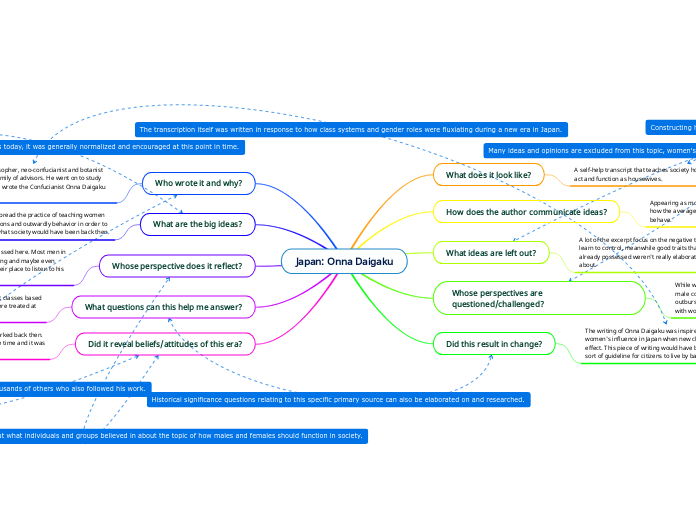Japan: Onna Daigaku
What does it look like?
A self-help transcript that teaches society how women should act and function as housewives.
How does the author communicate ideas?
Appearing as more of an instructional book, Ekken explains how the average housewife in Japan should and shouldn't behave.
What ideas are left out?
A lot of the excerpt focus on the negative traits women should learn to control, meanwhile good traits that women may already possessed weren't really elaborated on or talked about.
Whose perspectives are questioned/challenged?
While women would have almost certainly submitted to their male counterparts as lesser than them, the emotional outbursts described in the writing could have something to do with women's unhappiness with their treatment.
Did this result in change?
The writing of Onna Daigaku was inspired by the decline of women's influence in Japan when new class systems were in effect. This piece of writing would have been homage and a sort of guideline for citizens to live by back then.
Who wrote it and why?
Kaibara Ekken, a philosopher, neo-confucianist and botanist who was born into a family of advisors. He went on to study science and eventually wrote the Confucianist Onna Daigaku book.
What are the big ideas?
The big ideas were to spread the practice of teaching women to suppress their emotions and outwardly behavior in order to function obediently in what society would have been back then.
Whose perspective does it reflect?
Ekken's perspective is obviously expressed here. Most men in Japan would have agreed with his writing and maybe even some women would have felt it was their place to listen to his claims.
What questions can this help me answer?
Questions surrounding the topic of how different classes based off of gender functions, such as "how women were treated at this point in time".
Did it reveal beliefs/attitudes of this era?
It definitely revealed how classes of gender worked back then. Women were lesser counterparts of men at the time and it was essentially the norm for this era.
